

The Case for Hiring Employees With Zero Experience. It’s fair to say in business that people want to be associated with prestige, position and power -- whether it’s having those things themselves or being around others who do.
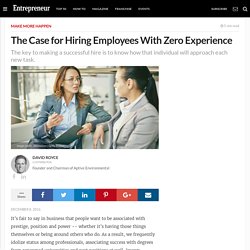
As a result, we frequently idolize status among professionals, associating success with degrees from renowned universities and past positions at well-known companies. Why Diversity Programs Backfire And How To Fix Them. New evidence suggests that diversity programs aren’t quite doing as well as they could.
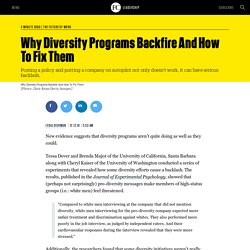
Tessa Dover and Brenda Major of the University of California, Santa Barbara along with Cheryl Kaiser of the University of Washington conducted a series of experiments that revealed how some diversity efforts cause a backlash. The results, published in the Journal of Experimental Psychology, showed that (perhaps not surprisingly) pro-diversity messages make members of high-status groups (i.e.: white men) feel threatened. "Compared to white men interviewing at the company that did not mention diversity, white men interviewing for the pro-diversity company expected more unfair treatment and discrimination against whites. Millennials in Workforce Will Make Employers Change Methods of Background Screening Job Applicants - ESR News Blog. Written By ESR News Blog Editor Thomas Ahearn Population estimates from the U.S.
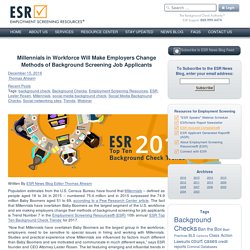
Census Bureau have found that Millennials – defined as people aged 18 to 34 in 2015 – numbered 75.4 million and in 2015 surpassed the 74.9 million Baby Boomers aged 51 to 69, according to a Pew Research Center article. Referrals may pose problems for diversity. According to research conducted by the University of Georgia, workers hired through ‘job-referral networks’ such as friends or social acquaintances can perpetuate a culture of inequality within the workplace.
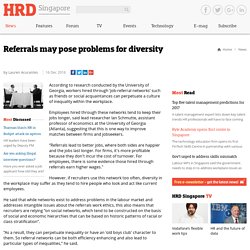
Employees hired through these networks tend to keep their jobs longer, said lead researcher Ian Schmutte, assistant professor of economics at the University of Georgia (Atlanta), suggesting that this is one way to improve matches between firms and jobseekers. “Referrals lead to better jobs, where both sides are happier and the jobs last longer. For firms, it's more profitable because they don't incur the cost of turnover. For employees, there is some evidence those hired through referrals earn higher wages.
" However, if recruiters use this network too often, diversity in the workplace may suffer as they tend to hire people who look and act like current employees. Lifelong learning is becoming an economic imperative. 6 Ways to Screen Job Candidates for Strategic Thinking. Every organization needs strategic thinkers.
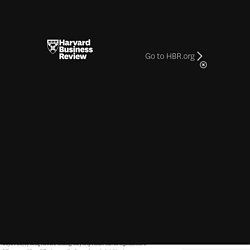
In a 2013 Management Research Group survey, when executives were asked to select the leadership behaviors that were most critical to their organization’s future success, 97% of the time they chose being strategic. This is because people who are able to think strategically add value in four ways. First, by being forward-looking, they help ensure that an organization is fully prepared for a difficult-to-predict future. Second, their big-picture perspective helps a firm avoid major problems and conflicts by connecting the dots and seeing the interrelationships between business elements.
Third, their external focus keeps everyone aware of emerging trends in the economy and the industry. Unfortunately, assessing whether a candidate is a strategic thinker is far from easy. Don’t rely on your job applicant to tell you whether they are strategic. Give Them a Real Problem to Solve Ask Specific Interview Questions Consider the Questions They Ask You. The Employers’ Holiday Wish: An Easy Hiring Process. 5 Best Strategies for Hiring Entry-Level Employees. Arguably, entry-level employees are incredibly underrated in most organizations.
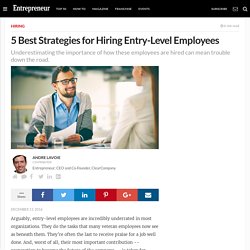
Ask the Expert: What Kind of Assessment Is Best for My Company? Question: I want to use assessments to help with our hiring process, but there are so many different kinds to choose from.
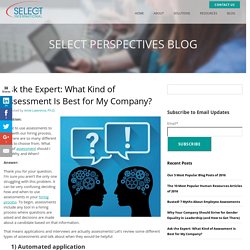
What kind of assessment should I use? Why and When? Answer: Thank you for your question. That means applications and interviews are actually assessments! 1) Automated application An automated application gathers traditional application information and then automatically makes decisions about candidates based on their answers. Automated applications are often the first step of a hiring process and are particularly helpful for organizations that have large numbers of applicants for a particular position. 2) Short screening assessments For organizations with high volume, they might also consider a short screening assessment immediately following the application. A large majority of candidates pass this assessment screen (usually 80-90%). Improving Candidate Experience for the Job Seekers You Don’t Interview. The Employers’ Holiday Wish: An Easy Hiring Process. Drawn-out hiring process is reason to give you pause. Is a lack of men making HR one-dimensional?
If the latest statistics are anything to go by, men are not just outnumbered in HR - they’re well and truly the minority.
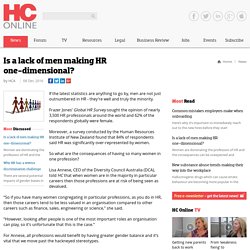
Frazer Jones’ Global HR Survey sought the opinion of nearly 3,500 HR professionals around the world and 62% of the respondents globally were female. Moreover, a survey conducted by the Human Resources Institute of New Zealand found that 84% of respondents said HR was significantly over-represented by women. Humanities graduates have an edge over MBAs in interpersonal skills. What does it take to make a mark in the corporate world and make it to the top?
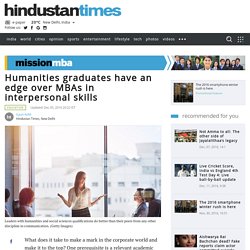
One prerequisite is a relevant academic qualification and in many cases it is an MBA (master’s in business administration) degree or a management diploma. But do MBAs really make great leaders as they work their way up the ladder? HR experts and researchers say MBAs tend to have better business know-how. But it is executives with a background in science, engineering and humanities who have an edge over MBAs when it comes to certain skills and responsibilities. Evan Sinar, chief scientist and vice president, Development Dimensions International (DDI), a US-based global HR consulting firm, says, “From our data for India Inc, we find that MBA graduates are stronger than those from engineering, social science, natural science, and IT backgrounds in their coaching skills.
Leaders with humanities and social sciences qualifications do better than their peers from any other discipline in communication. Why a Purpose-Driven Mission Is Key to Motivating Millennials. Lazy, entitled, delusional, narcissistic and unreliable are just some of the buzzwords managers are using to describe millennials.
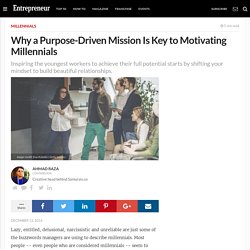
Stratégie social media : pourquoi La Poste cible les influenceurs locaux.